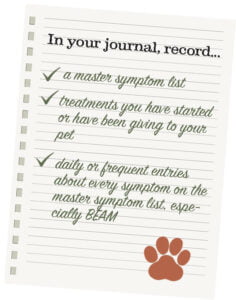Heartworm Treatment Controversy
There is a lot of controversy about heartworm preventatives. The drugs adversely affect many dogs. Any symptoms can become worse (weakened energy field produces many symptoms). Most dogs seem to recover from heartworm infection without the conventional drugs and without serious heart problems although they need careful and professional monitoring. There is, of course, a risk that your dog has an energy weakness for heart problems and if infected, will have serious problems.
Even among holistic veterinarians there are many opinions and approaches. Over the years at conferences, various veterinarians have reported problems with all of the preventatives. In 2005, at the Advanced Homeopathic Seminar, most practitioners had seen reactions for a few days after the preventative is given (not necessarily a bad thing, as the body is appropriately reacting to remove the toxic effects) and a fair amount of chronic disease. Some are not using any preventatives, and testing blood every 6 to 12 months. From the AHVMA conferences, many holistic veterinarians feel that dogs do fine on the monthly preventatives as well as the daily ones. We all agree that the drug companies are suggesting doses too high and frequencies too often.
So what should you do?
Heartworm Preventative – Is It Bad?
If you are afraid of your dog getting heartworms, give the preventative.
First, you need to know that the “heartworm preventative” does not PREVENT your dog from becoming infected, instead – it KILLS the migrating larvae so it prevents maturation, therefore no adults can reside in the heart where they can cause serious damage.
Different companies’ drug sheets and veterinarians’ experiences indicate that the dosages used can be given less frequently (though at least every 6 weeks) and will still kill the migrating larvae.
Knowing which preventative is the best, if any, for your dog is up to you. Observing your dog will give you clues that you need to try one of the other preventatives or use none at all. This is another example of the need to keep a Health Journal.
 The fewer drugs the better, so use ones just for heartworms, not other worms. And keep your observations in a journal to evaluate any reactions.
The fewer drugs the better, so use ones just for heartworms, not other worms. And keep your observations in a journal to evaluate any reactions.
When giving the preventative, give it less frequently than recommended.
The monthly can be safely given every 6 weeks.
Within the host mosquito, heartworm larvae need 30 days of temperatures over 57 degrees F. However, those 30 days need not be sequential. A run of colder nights will pause their growth, but they will resume at the same point as soon as it gets warmer. Give preventative until most mosquitoes are gone.
Once the heartworm microfilaria infect your dog, it takes 6 months for them to mature. This allows a little flexibility. For most of the U.S., you can test for heartworm around April, and if negative, start the preventative once temperatures warm up, as above. Stop once all mosquitos are gone in the fall/winter. Along the Gulf Coast, however, heartworm is a year-round problem.
Where possible, stopping for at few months each year will let you evaluate any impact the preventative is having on the animal. It is important to treat these as serious drugs, watch very carefully for side effects, even subtle ones, and then switch to another kind or treat the dog constitutionally. If you notice no subtle signs of problems from the drugs, keep using them judiciously.
I do not recommend giving Nux Vomica routinely after the preventative (no homeopathic remedies should be given routinely). You can certainly do energy healing, such as Reiki, Tellington TTouch, or Healing Touch, after giving a preventative. You can learn these modalities yourself or go to a practitioner.

If you choose to not give any preventative, what do you need to know?
Your dog could become infected, have a few adult worms in the heart and baby heartworms in the bloodstream, yet not be ill from the infection at all. A healthy body may be able to tolerate a low level of parasites. Therefore, many clients choose to use no preventative.
I support them in that choice and recommend blood tests twice a year, to allow the worms to mature and reproduce and show up in a blood test. These clients are also treating their dogs holistically in other ways, and being careful in high mosquito season to stay in or use repellent.
There are no herbal preventatives that I would feel are safe to give on a long term basis or are proven to prevent heartworms. There is a heartworm nosode, but we do not have sufficient information to tell if it is really protective. I sometimes use it when people are not going to use any preventative. Some homeopathic veterinarians feel it is protective, others have seen positive heartworm and also reaction to the nosode.
I have heard Cina or Sulphur or other remedies listed in the “lousiness” or “worm” rubrics suggested. But I do not recommend giving remedies on a continual basis. There is no evidence nor philosophical basis for using these remedies. Giving remedies that are not needed by the vital force can be damaging in the long run, so stick with non-homeopathic prevention.
Some people feel safe using Para-L from Good Herbs (again my concern is using herbs long term), or diatomaceous earth (garden grade, not pool filter kind) which is not harmful but I do not see how it helps. Though I still have little proof of effectiveness, I am fine with you using a flower essence on a daily basis. One is Para-outta-Site from Jackson Galaxy Solutions.
The best solution for heartworm prevention
The best solution is to make your dog as healthy as possible by vaccinating the least, feeding the best diet (probably a raw meat or freshly cooked meat diet with low carbs) for that individual dog, treat symptoms as clues to an underlying problem and treat the energy problem not merely stop the expression of the imbalance (the symptoms).
A truly healthy dog will be very unlikely to be ill from heartworms.
If your dog tests positive for heartworms, is it horrible?
No.
A healthy dog will have no heart problems and the worms will die in a year or so. There are alternative treatments (herbs and homeopathy) for adult heartworms that are 75% effective. You must have the heart checked by a veterinarian for problems and keep close watch on energy level, coughing, panting and exercise intolerance. If your dog begins to show any of these symptoms, begin holistic treatment.
~Dr. Christina Chambreau
